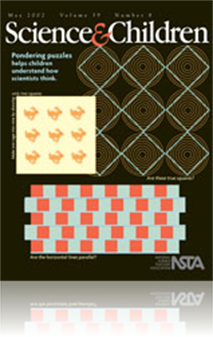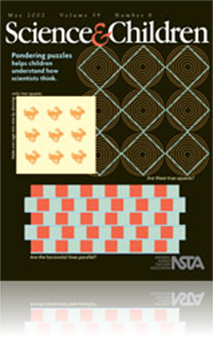All Resources
Journal Article
Writing a Statement of Teaching Philosophy
Writing a statement of teaching philosophy is a cornerstone of reflective and scholarly practice in teaching and learning. A strategic set of practica...
Journal Article
Weekly Reports: Student Reflections on Learning
Weekly reports, a structured journal form of formative assessment, allow instructors to receive information from the students, to address students’ ...
Journal Article
Wacky Machines: A unit on simple machines gets a new twist with old junk
The next community yard sale might be a repository of old, quirky items that are just the things to get students thinking about simple machines. By in...
Journal Article
Science and Children’s editor shares thoughts regarding the current issue, and also the neighborhood excitement of a bird building a nest on the fro...
Journal Article
Research and Teaching: Practical Considerations for Assessing Inquiry-Based Instruction
Research shows that inquiry learning promotes achievement and positive student attitudes toward science. One obstacle to implementing inquiry learning...
Journal Article
An aquatic insect aquarium is a great tool for teaching students about life cycles, food webs, environmental niches, and adaptations to pond life. Com...
Journal Article
Students enrolled in an Enhanced Bioscience Education (EBE) program maintained two documents: a group notebook to record observations made in the bios...
Journal Article
What Do Amphibians Have to Offer? Students monitor and map amphibians in local pond habitats
Scientists have expressed concern over amphibian decline. In a cooperative project with a university and a local high school, students monitor and map...
Journal Article
At its heart, science is fundamentally about solving questions, or puzzles. Puzzles are those things to which the solution is unknown—now. Each gene...
Journal Article
Role-playing is an effective summative activity that aids student learning and integrates science information and concepts. The authors describe the u...
Journal Article
Science Sampler: The Iron (Fe) Scientist
Can pennies be used to teach science? Learn how in this article using the science lesson, or Iron (Fe) scientist competition. as the author called it,...
Journal Article
As science educators we are faced with some issues associated with our choice of words and their implications for learning outcomes. Because the “h...
Journal Article
Hands on the Land, a new initiative to promote the use of public lands for environment-based education, consists of a national network of field classr...
Journal Article
Help slow the growth of landfills with strategies found in this month's insert provided by Keep America Beautiful, Inc. ...
Journal Article
While most schools offer different types of camps, a growing number are offering summer science camps. This provides a way for children to enjoy the s...









